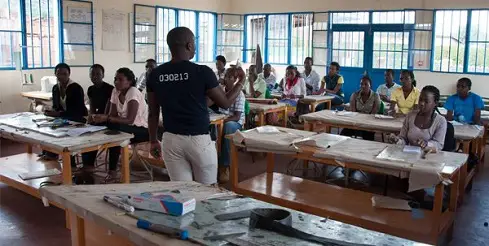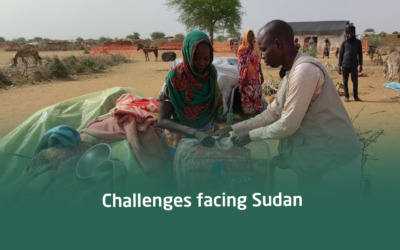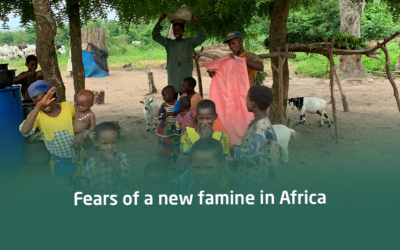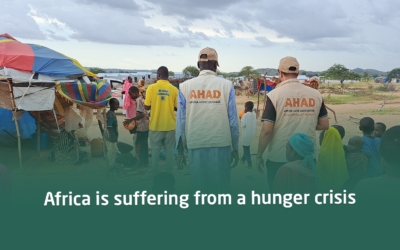Empowering education in Mali
The Republic Of Mali, one of the West African countries, is facing great challenges in the education sector, where education is an essential pillar for achieving economic and social development. The education system in Mali suffers from numerous problems, ranging from lack of funding and infrastructure, sexual and regional discrimination, armed conflicts, to the low quality of education and work skills. Nevertheless, the Malian government, in cooperation with international partners and donors, is adopting integrated efforts to promote and empower education in the country. These efforts require a multidimensional approach that includes improving infrastructure, ensuring access to education for all children, and improving the quality of education, with a special focus on promoting education for girls. In this article, we will address the main challenges facing the education sector in Mali, current initiatives and efforts to improve it.
Fundamental challenges in the education sector in Mali
The education sector in Mali is one of the most challenging, as it faces a range of obstacles that hinder the achievement of effective and comprehensive education. These challenges range from lack of funding, discrimination based on gender and region, the impact of armed conflicts, and inadequate educational curricula. We will detail these challenges and explain their impacts extensively:
Lack of funding and infrastructure
The lack of funding is one of the biggest obstacles facing the education sector in Mali. This problem significantly affects the provision of an adequate and adequate educational infrastructure. Classrooms are often overcrowded with students, which hinders the ability to provide effective instruction. In addition, educational facilities suffer from a severe shortage of textbooks, scientific laboratories, and the necessary technological tools. This lack of resources negatively affects the quality of education, limits the ability of students to make the most of the education available to them, resulting in poor educational results.
Sexual and regional discrimination
Girls and children in rural and remote areas face significant challenges in accessing education compared to their peers in urban areas. The school enrolment rate in rural areas is much lower, which leads to high illiteracy rates and restricts opportunities for learning and personal and professional development. Gender-based discrimination, in which families prefer boys ‘education over girls’, contributes to an increase in the educational gap between the Sexes. In addition, children in remote areas face geographical obstacles that make access to schools difficult, reinforcing gaps in access to education and hindering the progress of society as a whole.
Conflicts and security
Some regions of Mali suffer from constant armed conflicts, which significantly disrupt the educational process. Schools in conflict-affected areas are closed, families are forced to move to safer areas, which leads to school interruptions and a deterioration in the quality of Education. Children in these regions are missing crucial school years, which significantly affects their educational and professional future. Violence and displacement also affect the psychological stability of children, making it more difficult for them to achieve academically.
Quality of education and work skills
The educational curricula in Mali are outdated and do not keep pace with the requirements of the modern labor market. Students lack the basic and professional skills that qualify them for effective integration into the labor market. Current education is centered on theories without providing the practical training necessary for the development of life and professional skills. There is an urgent need to modernize the curriculum and include critical thinking skills, technology, and practical training to enhance graduate employment opportunities and improve living standards. Without these updates, graduates remain unprepared for the challenges of the modern labor market.
The challenges faced by the education sector in Mali show the complexity of the educational situation and the need for significant and coordinated efforts to address them. Addressing underfunding, gender and regional discrimination, the impact of conflicts, and improving the quality of Education requires integrated efforts from the Malian government, international partners, and civil society. Improving the education sector is not just a goal in itself, it is a key to achieving sustainable economic and social development in Mali. By investing in education, Mali can move forward towards a brighter and more prosperous future, where it promotes economic and social growth on strong and sustainable foundations.

Efforts to empower education in Mali: challenges and initiatives
Improving the education sector in Mali is an essential step for achieving sustainable development. Mali faces significant challenges in this sector, but the Malian government, in cooperation with international partners and local organizations, is making continuous efforts to enhance access to education, improve its quality, and promote education for girls. The following is an extensive explanation of these initiatives and current efforts:
Promoting access to education
The Malian government, in cooperation with international partners, is making strenuous efforts to promote access to education throughout the country. Such efforts include:
– In remote and rural areas, the government is adopting programs for the construction of new schools aimed at reducing overcrowding in classrooms and providing a favorable learning environment. This contributes to better educational opportunities for children living in areas far from urban centers.
– To ensure that students get to their schools safely and easily, the government provides school buses in areas where the distances between homes and schools are large. This measure reduces school dropout rates due to the difficulty of getting to school.
– The government and its partners are organizing awareness-raising campaigns targeting families to increase their awareness of the importance of education and its long-term benefits. These campaigns provide material incentives and financial support to the poorest families to encourage them to send their children to school, which contributes to raising the school enrollment rate.
Improving the quality of Education
The Malian government seeks to improve the quality of education through several programs and initiatives:
– Ongoing training programs are being implemented to improve the skills of teachers and update their knowledge of modern teaching methods. These programs include workshops and training courses aimed at enhancing the educational competence of teachers, which is positively reflected in the level of education provided to students.
– The efforts exerted include reviewing and updating the curricula to keep pace with the requirements of the modern labor market. New study subjects focusing on practical skills and technology are being introduced, which enhances the students ‘ ability to adapt to changes in the labor market.
– Securing books, educational equipment and technological means is an important part of improving the quality of Education. These efforts are aimed at providing the necessary tools that enhance the learning process and make it more effective.
Promoting education for girls
Many international and local organizations focus on promoting education for girls through diverse initiatives including:
– These projects include the construction of schools for girls or the provision of mixed classrooms that encourage the participation of girls in education. These efforts seek to create a safe and supportive learning environment for girls.
– Organizations provide financial or material support to families to reduce the economic burden associated with girls ‘ education. This support includes scholarships and the provision of school uniforms and school supplies, encouraging families to educate their daughters.
– Implementation of community awareness campaigns aimed at changing the traditional perception that reduces the value of girls ‘ education. Local and religious leaders are involved in spreading the importance of girls ‘education and its role in the development of society, helping to overcome cultural and social obstacles to girls’ education.
Improving and empowering education in Mali requires a continuous and comprehensive effort that includes improving infrastructure, ensuring universal access to education, and improving its quality, with a special focus on girls ‘ education. The challenges facing education in Mali are great, but through cooperation between the government, international partners and the local community, tangible progress can be achieved in this vital sector. Education is the key to sustainable and economic development, an investment in the future of the country. Achieving a comprehensive and high-quality education for all children in Mali is the essential step towards building a more prosperous and sustainable society. With continuous efforts and integrated initiatives, Mali can overcome the current challenges and achieve a bright future for its future generations.
Ahad society
Ahad Association is a non-profit organization that works in various fields to provide support and assistance to communities in need. The association’s services vary to include many humanitarian, educational, health and social aspects.
Ahad Association plays a vital role in supporting and developing communities through its diverse services that cover many vital aspects. The association always seeks to expand and develop the scope of its services to meet the needs of as many people as possible, and to achieve a positive and sustainable impact in the lives of individuals and communities. Cooperation with the local community and international partners can enhance the effectiveness of these services and ensure their continuity to achieve the Sustainable Development Goals.
You can visit the AHAD Association’s website to find out more about the projects it offers
Read also:
Distribution of food baskets to needy families in Africa
Join us in our message
You can visit the AHAD website to find out more about the projects it offers
ALSO READ
WHAT THE FOOD BASKET CONTAINS IN AHAD
Join us in our message




